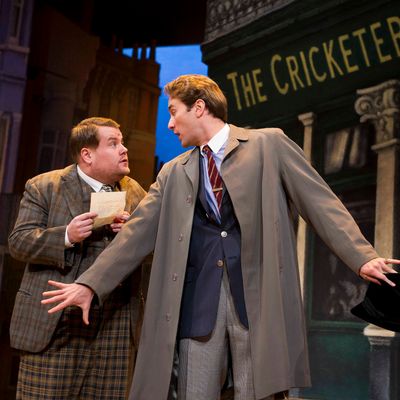
Don’t look now: Broadway, home of overage, might actually be getting back to basics. (Only dramaturgically, I’m afraid — ticket prices remain stubbornly maximalist.) With Peter and the Starcatcher, that couch-cushion castle of a show, already gleefully rediscovering the pure sense of play in playmaking, up bumbles One Man, Two Guvnors, a marvelously executed, deceptively straightforward bit of comic roughhouse fresh off a successful London run.
Its operating system? Nothing more sophisticated than commedia dell’arte — wily clowns and moony young lovers versus stingy codgers and the tyranny of situational irony. But much like its plump Harlequin hero (gifted British comedian James Corden, last seen on these shores as Timms in The History Boys), One Man’s simpleton puss conceals whirling, whizbang gears beneath: This isn’t just an expert demo in comedy fundamentals but a full cross-section diagram of Why We Laugh, from meticulously choreographed pratfalls to the controlled chaos of improv: Artisanal rib-tickling, prepared fresh, before your eyes, and a bit different every night. (Exactly how different? Sussing out the exact boundaries of One Man’s spontaneity is one of its many joys, so don’t expect any spoilers here.)
Playwright Richard Bean has freely yet faithfully adapted Carlo Goldoni’s eighteenth-century farce The Servant of Two Masters, itself rooted in the codified low comedy of the Italian Renaissance. Bean swizzles this hoary classic in the warm beer of commedia’s close Britannic cousins, pantomime and the English music hall (the Blighty equivalent of vaudeville), and plops the whole thing down in the early sixties, in the seaside getaway hamlet of Brighton. Here we meet amateur henchman Francis Henshall (Corden), surrounded by tantalizing “pubs that do food” and tormented by the greasy aroma of fish and chips. Eternally peckish, chronically broke, this clown has traded his motley for mismatched tweed, but the same stomach beats beneath. His needs are simple — sustenance, sex, and survival, in that order — but the lengths to which he’ll go to fulfill them are delightfully protracted and pretzel-shaped, and Corden, a born showman seemingly made of the same hyperkinetic polymers that go into Superballs, avidly contorts himself to fit every twist and turn.
Francis is employed by a small-time gangster, Rachel (Jemima Rooper), posing in drag as her late and unlamented brother Roscoe to collect some of his filthy lucre and run off with his killer, the posh sadist Stanley (Oliver Chris). Francis’s troubles multiply when he’s also employed as a body man by Stanley, on the run from the law himself and unaware of Rachel’s plan or her presence. He must conceal one guvnor (i.e., boss) from the other, even as they converge on the same pub and demand dinner at the same time. This clockwork pandemonium, in which Francis must feed both guvs and himself — enlisting help first from a majestically decrepit waiter (the ruinously funny Tom Edden) with an adjustable pacemaker and a seemingly endless capacity for physical punishment, then from a quizzical audience member — crowns the first act and the evening.
The tortured plot, naturally, is little more than a roller-coaster track, its many corkscrews just a twisty means to a pleasantly foreordained end. Corden, whose mastery of audience rapport rivals his immense physical gifts, realizes this, and, in the pantomime tradition, welcomes our recognition of convention, but in celebration of it, not in superiority to it. (Contrast this with the relatively recent but already wearisome American habit of winking so hard, we nearly put an eye out.) Bean has built in several opportunities for Corden to engage the crowd, but he’s also created a lot of carefully stage-managed entropy, where our sense of what’s planned and what’s not becomes fantastically confused. There are even opportunities for audience members to involve and perhaps overinvolve themselves, but caveat amateur: Corden can and will eat you alive.
His supporting cast is similarly sharp, across the board, though the men’s parts have clearly been lavished with special attention. (Rooper, in the drag role, has little to do beyond glowering and stalking around.) Chris, as psycho-eyed boarding-school casualty Stanley, gets most of the good lines (“What do I call you? I don’t do first names. First names are for girls and Norwegians”), and delivers them at epee-point; he and Corden have a diabolical chemistry. “You’re a strange planet,” Stanley tells Francis, and he is, indeed: Corden (an enormous sitcom star in the U.K.) brings with him his own comic atmosphere, a microclimate where Yank audiences who don’t know their Arsenal from their elbow are laughing along at jokes about cricket and Margate, simply because they’re responding, on a limbic level, to centuries-old timing and rhythms, executed by consummate professionals. Comedy, handmade right in front of you: Your belly, flat or flabby, will thank you for the laughs.
One Man, Two Guvnors is playing at The Music Box Theater.




